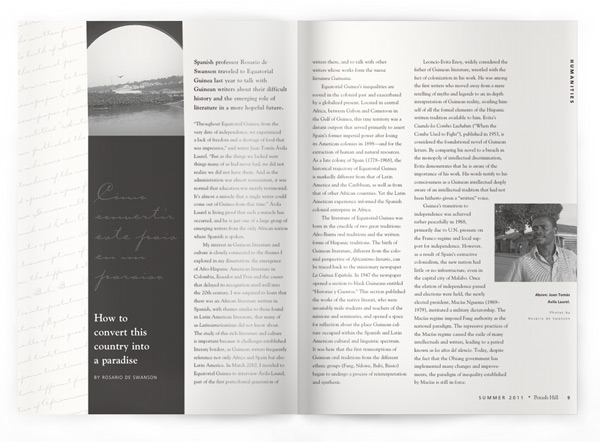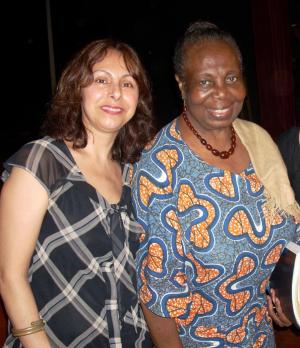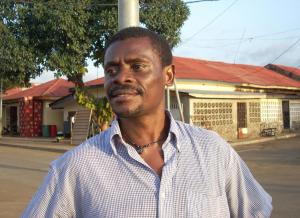How to convert this country into a paradise

Cómo convertir este país en un paraíso
by Rosario de Swanson
Spanish professor Rosario de Swanson traveled to Equatorial Guinea last year to talk with Guinean writers about their difficult history and the emerging role of literature in a more hopeful future.
“Throughout Equatorial Guinea, from the very date of independence, we experienced a lack of freedom and a shortage of food that was impressive,” said writer Juan Tomás Ávila Laurel. “But as the things we lacked were things many of us had never had, we did not realize we did not have them. And as the administration was almost nonexistent, it was normal that education was merely testimonial. It’s almost a miracle that a single writer could come out of Guinea from that time.” Ávila Laurel is living proof that such a miracle has occurred, and he is just one of a large group of emerging writers from the only African nation where Spanish is spoken.
My interest in Guinean literature and culture is closely connected to the themes I explored in my dissertation: the emergence of Afro-Hispanic American literature in Colombia, Ecuador and Peru and the causes that delayed its recognition until well into the 20th century. I was surprised to learn that there was an African literature written in Spanish, with themes similar to those found in Latin American literature, that many of us Latinoamericanistas did not know about. The study of this rich literature and culture is important because it challenges established literary borders, as Guinean writers frequently reference not only Africa and Spain but also Latin America. In March 2010, I traveled to Equatorial Guinea to interview Ávila Laurel, part of the first postcolonial generation of writers there, and to talk with other writers whose works form the nueva literatura Guineana.
Equatorial Guinea’s inequalities are rooted in the colonial past and exacerbated by a globalized present. Located in central Africa, between Gabon and Cameroon in the Gulf of Guinea, this tiny territory was a distant outpost that served primarily to assert Spain’s former imperial power after losing its American colonies in 1898—and for the extraction of human and natural resources. As a late colony of Spain (1778–1968), the historical trajectory of Equatorial Guinea is markedly different from that of Latin America and the Caribbean, as well as from that of other African countries. Yet the Latin American experience informed the Spanish colonial enterprise in Africa.

The literature of Equatorial Guinea was born in the crucible of two great traditions: Afro-Bantu oral traditions and the written forms of Hispanic traditions. The birth of Guinean literature, different from the colonial perspective of Africanismo literario, can be traced back to the missionary newspaper La Guinea Española. In 1947 the newspaper opened a section to black Guineans entitled “Historias y Cuentos.” This section published the works of the native literati, who were invariably male students and teachers of the missions and seminaries, and opened a space for reflection about the place Guinean culture occupied within the Spanish and Latin American cultural and linguistic spectrum. It was here that the first transcriptions of Guinean oral traditions from the different ethnic groups (Fang, Ndowe, Bubi, Bissio) began to undergo a process of reinterpretation and synthesis.
Leoncio Evita Enoy, widely considered the father of Guinean literature, wrestled with the fact of colonization in his work. He was among the first writers who moved away from a mere retelling of myths and legends to an in-depth interpretation of Guinean reality, availing himself of all the formal elements of the Hispanic written tradition available to him. Evita’s Cuando los Combes Luchaban (“When the Combe Used to Fight”), published in 1953, is considered the foundational novel of Guinean letters. By comparing his novel to a breach in the monopoly of intellectual discrimination, Evita demonstrates that he is aware of the importance of his work. His words testify to his consciousness as a Guinean intellectual deeply aware of an intellectual tradition that had not been hitherto given a “written” voice.
Guinea’s transition to independence was achieved rather peacefully in 1968, primarily due to U.N. pressure on the Franco regime and local support for independence. However, as a result of Spain’s extractive colonialism, the new nation had little or no infrastructure, even in the capital city of Malabo. Once the elation of independence passed and elections were held, the newly elected president, Macías Nguema (1969–1979), instituted a military dictatorship. The Macías regime imposed Fang authority as the national paradigm. The repressive practices of the Macías regime caused the exile of many intellectuals and writers, leading to a period known as los años del silencio. Today, despite the fact that the Obiang government has implemented many changes and improvements, the paradigm of inequality established by Macías is still in force.
When I asked Juan Tomás Ávila Laurel about recent reforms, he responded, “The most important change is to see the dimming of repression. Now there are no beatings or arbitrary arrests in public. Clearly, if the previous regime had persisted I would not be a writer. Now people in the country can accuse the president of wrongdoing and live. In the Macías regime, a small criticism spelled a mortal threat.”
Today, Equatorial Guinea’s problems and inequalities have become aggravated by the extreme exploitation of the country’s natural resources. The discovery of oil in the ’90s marked the entry of Guinea into the world markets as a powerful oil producer, but this economic boom has not led to improvements for many of its citizens. Instead, it has installed a brand of capitalism that seeks to turn Guineans into consumers of Western goods. Most Guineans who can afford it drink water from imported plastic bottles; however, since there are no provisions for proper disposal, these symbols of Western modernity litter the landscape. Corruption is rampant, and life for most Guineans is lived under feudal conditions: Equatorial Guinea stands out as the only African country where the economic growth rate is among the highest in the world while the majority of the population lives in poverty.

Against this backdrop, the writers, artists and intellectuals of the various ethnicities have become a powerful force for integration, resistance and consciousness-raising through their literature and works of art. In his essays, Ávila Laurel examines the roots of Guinean inequalities, its history and politics, and the contradiction between state modernizing initiatives and life as it is lived by most Guineans. He also offers a penetrating critique of Guinea’s culture, traditions and attitudes, rooted in Guinea’s tragic and rich history, where he also finds the promise of Guinea’s future.
In our interview he said, “The Guinean intellectual should denounce certain things that happen in our society, not because he is an intellectual but because there are some people who have the possibility of having their opinions disseminated and heard. Since this is a multiethnic nation, our cultures should reconcile or unify us. Cultural manifestations should be the expression of our Guinean-ness, with culture understood as its crystallization.”
Ávila Laurel explores the future of development in Equatorial Guinea in many of his essays, such as “Cómo convertir este país en un paraíso.” In our interview he said he wanted Guinea to enjoy a kind of development that takes into account ethnic diversity, the environment and the material and spiritual needs of the people. Although the term “barbarism” was once associated with indigenous peoples, and served as justification for the colonial enterprise, Ávila Laurel criticizes the barbarism of the despotic model adopted by Macías and his successors. “If someone says they are developed but they lack human rights, they are not,” he said. “If I dare to associate barbarism with Macías it is to relate his regime to Western culture. Macías was more the product of Western civilization than of African culture.”
The essays of Juan Tomás Ávila Laurel provide a contemporary insight on debates that dominated Latin American intellectual and political thought at the end of the 19th and early in the 20th century but are now part of Guinea’s intellectual discourse about the future. In the end, Ávila Laurel shares the same distrust of the economic benefits of “civilization” as his predecessor Leoncio Evita Enoy, who in his novel referred to it as a “sickness.” “Some believe they are superior to others because they come from a society that has learned to influence nature,” said Ávila Laurel. “Usually the so-called civilized society is the leader in the domain of nature. It is clear that those who have managed to dominate nature have abused this privilege. Guinea’s struggle is to find its place in the world without believing that it is a sin not to have taken the same steps as other countries on other continents.”
Rosario de Swanson teaches Spanish and Latin American literature at Marlboro. Her article “Autoenografía, espacio, identidad y resistencia en la narrativa fundacional de Guinea Ecuatorial: Cuando los combes luchaban (1953) de Leoncio Evita Enoy” is to be published in Revista Iberoamericana in 2011. Her interview with Juan Tomás Ávila Laurel, titled “Si alguien dice que está desarrollado y no goza de los derechos humanos, no lo está,” will appear in Hispanic Journal.
Cold War Femininity
 Not unlike postcolonial African writers grappling with their national identity, acclaimed author Flannery O’Connor struggled with issues of femininity in the postwar era. Although most scholars have downplayed it, Elizabeth Ferrell ’11 chose to focus on this struggle in her Plan of Concentration. “Despite O’Connor’s persistent refusal to accept that her female characters experience a plight beyond religion, it is still apparent that she had a unique stance as a critically acclaimed female writer in the 1940s,” said Elizabeth. In studying the multifaceted female characters in O’Connor’s short fiction, Elizabeth concluded that their complexity extends to gender dynamics as well as religious themes. “Much like these characters can’t be contained within the traditional submissive female role, they also refuse to be pigeonholed into being plot devices for religious purposes.”
Not unlike postcolonial African writers grappling with their national identity, acclaimed author Flannery O’Connor struggled with issues of femininity in the postwar era. Although most scholars have downplayed it, Elizabeth Ferrell ’11 chose to focus on this struggle in her Plan of Concentration. “Despite O’Connor’s persistent refusal to accept that her female characters experience a plight beyond religion, it is still apparent that she had a unique stance as a critically acclaimed female writer in the 1940s,” said Elizabeth. In studying the multifaceted female characters in O’Connor’s short fiction, Elizabeth concluded that their complexity extends to gender dynamics as well as religious themes. “Much like these characters can’t be contained within the traditional submissive female role, they also refuse to be pigeonholed into being plot devices for religious purposes.”
